Candidate McCain
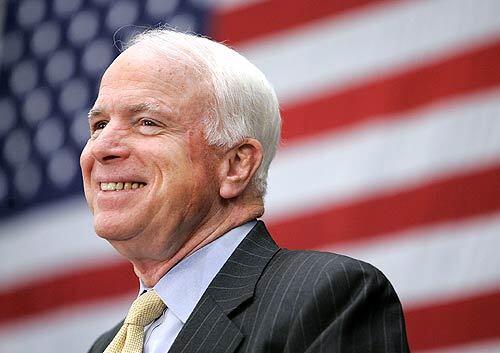
John McCain entered the race for the White House as one of the favorites, but his fortunes turned last summer. Two top aides resigned, more than half of his staff was laid off, fundraising nearly dried up, and he narrowed his focus to just three states. Then, in December, his foundering campaign suddenly gained momentum. (Mark Boster / Los Angeles Times)
Sen. McCain, R-Ariz.,the Republican nominee for president, waits in the wings to see who he will face off with in November.
Mark Boster / Los Angeles Times
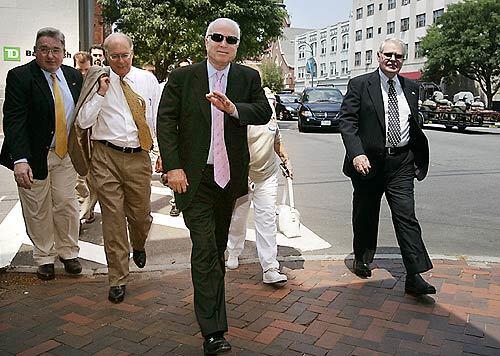
McCain, on the campaign trail in New Hampshire, left, dominated George W. Bush in the primary there in 2000, winning by 18 percentage points. The picture dimmed this year, with Mitt Romney taking a commanding lead in the polls, but a burst of endorsements recently has political analysts talking about a McCain resurgence. Fellow political maverick and onetime Democratic vice presidential nominee Sen. Joe Lieberman of Connecticut announced his support for McCain. He told Fox News that the Arizona senator was “the best of all the candidates to unite our country across political lines.” (Mark Boster / Los Angeles Times)
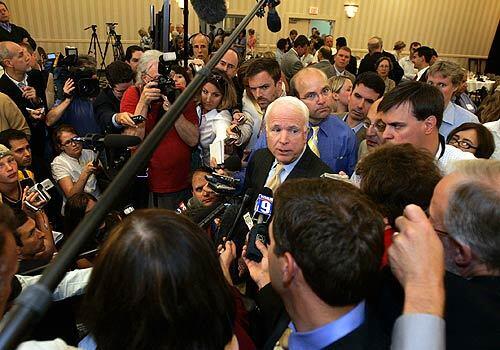
McCain is counting on a strong showing in New Hampshire on Jan. 8 to propel his candidacy in South Carolina, where voters go to the polls two weeks later. New Hampshire’s independent voters, who can register to vote on election day in either primary, could be the key for McCain. Many core Republican voters were turned off by his push for legislation that would have created a path to citizenship for some of the nation’s more than 12 million illegal immigrants. Although McCain has adjusted his position, it’s unclear whether conservative voters have adjusted theirs. (Mark Boster / Los Angeles Times)
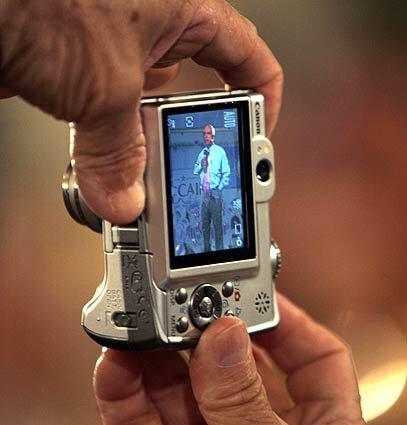
In the digital age, nearly everything a candidate says or does is recorded by the media and the masses. Candidates have responded in kind, with sophisticated websites that highlight their accomplishments, hail their endorsements and solicit support. McCain’s prominently displays a black-and-white image of him in a North Vietnamese prison camp, with the words “Watch the incredible story of a true American hero who is singularly prepared to lead.” (Mark Boster / Los Angeles Times)
Advertisement
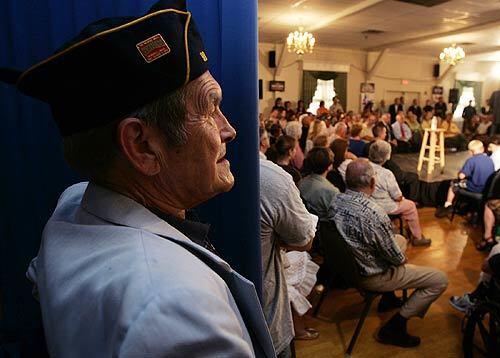
McCain’s service as a Navy pilot and his experiences as a POW have in many ways shaped his candidacy. Military veteran Frederic Tarr, left, watches McCain during a town hall meeting in Keene, N.H., in July. McCain, joined by several other former POWs on his No Surrender Tour, told an audience in December that he was no hero. “I just caught a surface-to-air missile with my plane. That doesn’t take much skill.” (Mark Boster / Los Angeles Times)
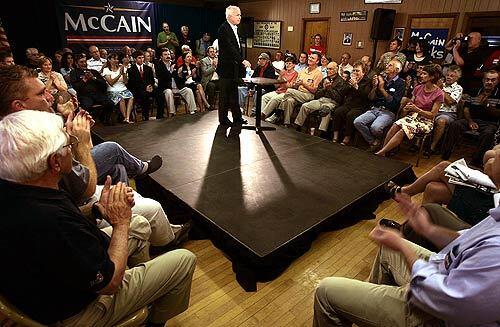
When John McCain addressed this group at a town hall meeting in Claremont, N.H., last summer, he was fighting a losing battle in his support for U.S. military escalation in Iraq. Public support for the war was low, and other GOP candidates were keeping their distance from what is commonly known as the “surge.” (Mark Boster / Los Angeles Times)
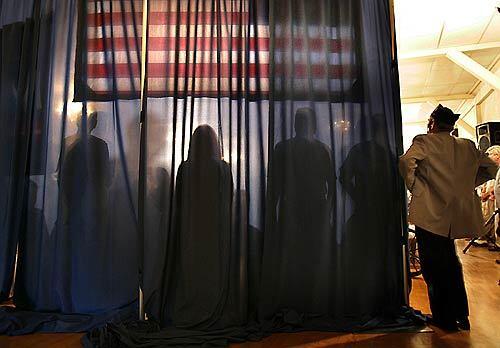
Iraq’s civilian death toll has dropped sharply in recent months, which the Pentagon credits to the decision to send more U.S. troops. “I knew what needed to be done, and now we’re doing it,” McCain said. Yet it is far from clear that GOP voters are ready to reward him. McCain might have been right about the need for a troop buildup, said Karin Hollack, a Republican college student from Iowa, but that does not make him any less “off-putting.”
“I don’t really like him,” she said. (Mark Boster / Los Angeles Times)
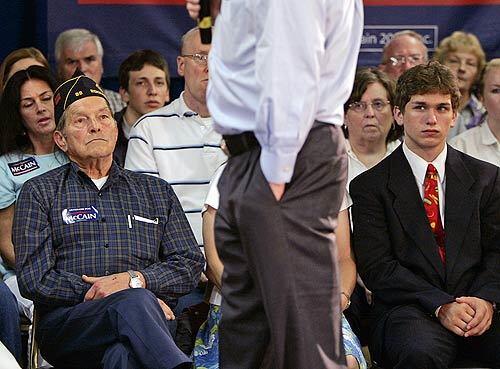
Military veteran Frederic Tarr listens to his candidate’s take on the issues at a town hall meeting at the American Legion hall in Claremont, N.H. McCain has visited many Veterans of Foreign Wars and American Legion halls during his No Surrender Tour, often with fellow veterans at his side, some of them fellow former POWs. Dennis Devine Sr., a third-generation infantryman who served in South Korea, told a room full of veterans in Council Bluffs, Iowa: “If you are not going to vote for this man, you had better come and talk to me.” (Mark Boster / Los Angeles Times)
Advertisement
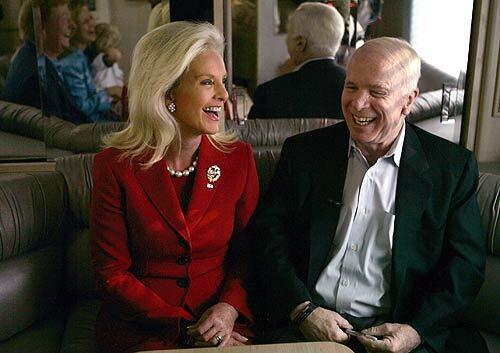
John McCain and his wife, Cindy, enjoy some quiet time on their campaign tour bus in South Carolina. If McCain, 71, beats the odds and wins the Republican nomination and then the general election, he would be the oldest person to assume the presidency. Ronald Reagan was 69 when he entered office in 1981. (Mark Boster / Los Angeles Times)
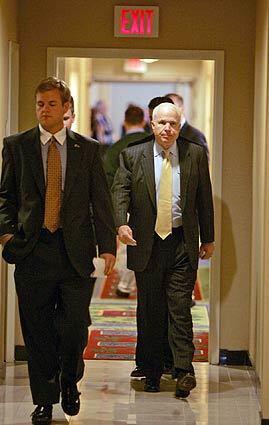
John McCain, here in Concord, N.H., in the wake of his staff shake-up last summer, has alienated many conservative Republican voters with his moderate views on immigration, campaign finance, stem cell research and global warming. He has tried to leverage his steadfast support for the U.S. war in Iraq, but political analysts say the issue has not given him much traction. (Mark Boster / Los Angeles Times)
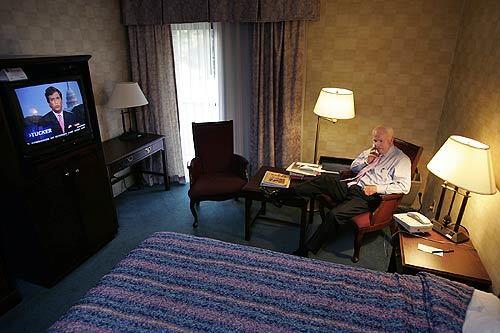
“I can out-campaign anyone. It won’t be easy. But it’s not supposed to be easy. [The presidency] is the most important job in the world.” (Mark Boster / Los Angeles Times)







